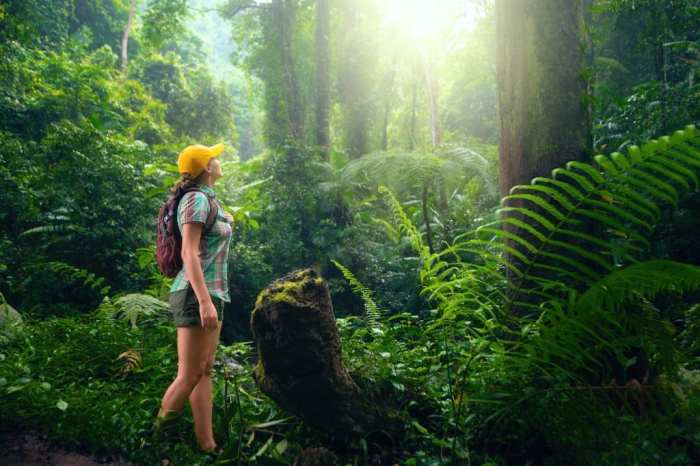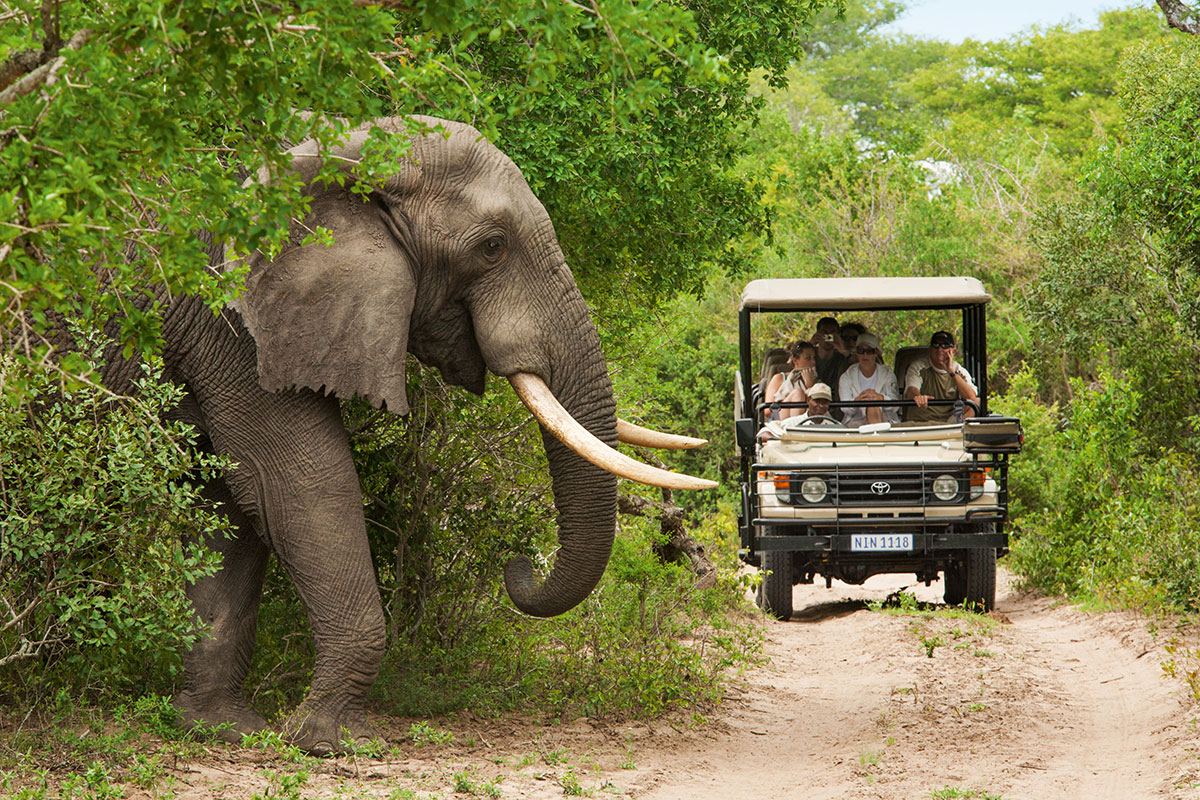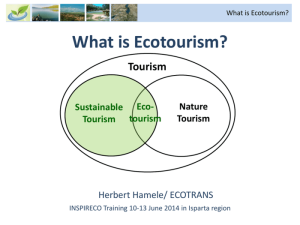
Embark on a journey into the world of Wildlife Ecotourism Experiences, where the beauty of nature meets sustainable travel practices, offering a unique adventure for all nature enthusiasts.
Discover the wonders of wildlife conservation intertwined with unforgettable travel experiences that leave a positive impact on local communities and ecosystems.
Overview of Wildlife Ecotourism Experiences
Wildlife ecotourism involves responsible travel to natural areas to observe and appreciate wildlife while minimizing the impact on the environment. It plays a crucial role in conservation efforts by raising awareness, generating funds for protection programs, and promoting sustainable practices.
Significance of Wildlife Ecotourism
- Supports Conservation: Wildlife ecotourism provides financial support for wildlife reserves, national parks, and conservation projects, contributing to the preservation of biodiversity and habitats.
- Economic Benefits: Local communities benefit from ecotourism through job creation, income generation, and opportunities for small businesses, reducing the reliance on unsustainable practices like poaching or deforestation.
- Educational Opportunities: Visitors gain a deeper understanding of wildlife and ecosystems, fostering a sense of appreciation and respect for nature, which can lead to long-term conservation efforts.
Ethical Considerations in Wildlife Ecotourism
- Respect Wildlife: It is essential to observe animals from a safe distance, avoid disturbing their natural behavior, and never feed or touch them. Ensuring minimal intrusion is crucial for their well-being.
- Support Local Communities: Choose ecotourism operators that prioritize the involvement and benefit of local communities, respecting their traditions, culture, and rights while sharing the economic gains.
- Sustainable Practices: Sustainable tourism practices, such as reducing waste, conserving resources, and supporting eco-friendly accommodations, are vital to minimize the environmental impact of ecotourism activities.
Popular Destinations for Wildlife Ecotourism

When it comes to wildlife ecotourism, there are several destinations around the world that stand out for offering unique experiences in nature. These destinations not only provide a chance to see diverse flora and fauna up close but also highlight the importance of preserving ecosystems for future generations.
Costa Rica
Costa Rica is renowned for its rich biodiversity, with lush rainforests, pristine beaches, and diverse wildlife. Visitors can spot colorful toucans, sloths, and monkeys in their natural habitat. The country’s commitment to conservation and eco-friendly practices make it a top choice for wildlife enthusiasts.
Galapagos Islands, Ecuador
The Galapagos Islands are a UNESCO World Heritage site known for their unique species that inspired Charles Darwin’s theory of evolution. Visitors can see giant tortoises, marine iguanas, and blue-footed boobies. Preserving the delicate balance of these islands is crucial for the survival of these endemic species.
Maasai Mara, Kenya
The Maasai Mara National Reserve in Kenya is famous for the annual wildebeest migration, where millions of animals cross the Mara River. Visitors can witness this spectacular natural phenomenon and see lions, elephants, and giraffes in their natural habitat. Conservation efforts are vital to protect these iconic species.
Types of Wildlife Encountered in Ecotourism
When embarking on wildlife ecotourism experiences, travelers have the opportunity to encounter a diverse range of species in their natural habitats. These encounters not only provide a thrilling experience but also play a crucial role in raising awareness about conservation efforts.
Mammals
- Elephants: These gentle giants play a key role in shaping their habitats by creating pathways for other animals and dispersing seeds.
- Tigers: As apex predators, tigers help regulate prey populations, maintaining a balance in the ecosystem.
- Gorillas: Gorillas are essential for seed dispersal and maintaining biodiversity in forests.
Birds
- Eagles: Eagles are top predators that help control populations of smaller animals, contributing to the overall health of the ecosystem.
- Parrots: Parrots are important seed dispersers, helping in the regeneration of forests.
- Flamingos: These birds play a crucial role in controlling algae levels in their habitats.
Marine Life
- Dolphins: Dolphins are indicators of ocean health and play a role in the balance of marine ecosystems.
- Sea Turtles: Sea turtles help maintain healthy seagrass beds and coral reefs by controlling sponge populations.
- Whales: Whales play a vital role in nutrient recycling in the oceans through their movements and feeding behaviors.
Sustainable Practices in Wildlife Ecotourism
When it comes to wildlife ecotourism, implementing sustainable practices is crucial to ensure the preservation of natural habitats and the well-being of the wildlife populations. These practices not only minimize the negative impact on the environment but also contribute to the local community’s socio-economic development.
Reducing Carbon Footprint
One of the key sustainable practices in wildlife ecotourism is reducing the carbon footprint of operations. This can be achieved by using eco-friendly transportation options, promoting energy efficiency, and implementing waste management strategies.
Supporting Local Communities
Responsible tourism plays a significant role in preserving natural habitats by supporting local communities. Engaging with indigenous populations, promoting local businesses, and investing in community development projects can help ensure the long-term conservation of wildlife and their habitats.
Conservation Education
Successful initiatives promoting sustainable ecotourism often include conservation education programs. By raising awareness about the importance of wildlife conservation and promoting responsible behavior among visitors, these initiatives contribute to the protection of endangered species and their habitats.
Ecotourism Principles and Benefits

Ecotourism is a form of tourism that focuses on responsible travel to natural areas, promoting conservation, and supporting local communities. The core principles of ecotourism include minimizing impact, building environmental and cultural awareness, providing positive experiences for both visitors and hosts, and supporting conservation efforts.
How Ecotourism Contributes to Conservation Efforts
Ecotourism plays a crucial role in conservation efforts by providing financial incentives for the protection of wildlife and their habitats. By attracting visitors to natural areas, ecotourism generates revenue that can be used for conservation projects, anti-poaching initiatives, and habitat restoration. Additionally, ecotourism helps raise awareness about the importance of preserving biodiversity and ecosystems.
- Ecotourism supports the protection of endangered species by creating economic opportunities for local communities, reducing their reliance on activities that harm wildlife.
- Through ecotourism, conservation organizations can fund research and monitoring programs to track wildlife populations and implement effective conservation strategies.
- By engaging visitors in educational experiences, ecotourism fosters a deeper appreciation for nature and encourages sustainable behaviors that benefit the environment.
Success Stories of Ecotourism Projects Benefiting Wildlife and Local Communities
One notable success story is the Mountain Gorilla ecotourism in Rwanda, Uganda, and the Democratic Republic of Congo. By allowing a limited number of visitors to observe these endangered primates in their natural habitat, ecotourism has contributed to the growth of gorilla populations and provided economic opportunities for local communities. Revenue from gorilla trekking permits is invested in conservation efforts and community development projects, enhancing both wildlife protection and local livelihoods.
Ecotourism serves as a powerful tool for conservation, promoting sustainable practices and fostering a harmonious relationship between humans and nature.
In conclusion, Wildlife Ecotourism Experiences provide a gateway to connect with nature ethically, promoting conservation efforts while creating memorable adventures that support both wildlife and local economies.
FAQ Corner
What is the significance of wildlife ecotourism in conservation efforts?
Wildlife ecotourism plays a crucial role in raising awareness about conservation issues and generating funds for protecting wildlife and their habitats.
How do popular destinations contribute to wildlife ecotourism?
Popular destinations attract eco-travelers, providing opportunities to experience diverse wildlife while supporting local conservation initiatives.
What are some sustainable practices followed in wildlife ecotourism?
Sustainable practices include minimizing environmental impact, supporting local communities, and educating visitors on conservation efforts.
How does ecotourism benefit local economies?
Ecotourism boosts local economies by creating jobs, supporting small businesses, and fostering a sense of environmental stewardship among residents.






